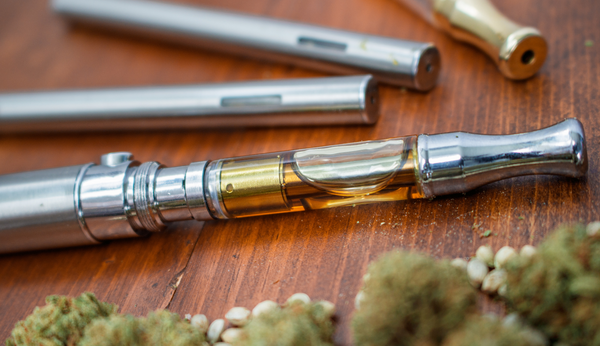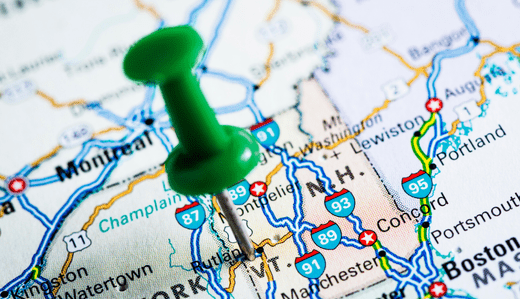Your Cart is Empty
FREE SHIPPING ON ALL ORDERS $75+
Delta-8-THC is legal according to federal law, but some states disagree. Is Delta-8-THC legal in Vermont? And if so, where can you find it?
Vermont originally had pretty relaxed cannabis and hemp laws, and all forms of hemp and its derivatives seemed to be legal in the state. Now, Vermont has clarified their stance on Dleta-8-THC products derived from hemp, labelling them as "synthetically derived." Because of this recent decision, Delta-8 products are illegal in Vermont.
Here's everything you need to know about Vermont Delta-8 laws:
Disclaimer: We’re always working to stay informed on the latest Delta-8 laws and research. However, state laws are subject to change and we advise that you do your own research to verify the information you find in this article. This is not intended as legal advice.
Table of Contents
Delta-8-THC and Federal Laws
Vermont Delta-8-THC Laws
Is Delta-8 a Controlled Substance in Vermont?
Delta-8-THC Possession Limits in Vermont
Is Delta-9-THC Legal in Vermont?
Where to Buy Delta-8 in Vermont
Do You Have to Be 21 to Buy Delta-8?
Is Delta-8 Legal in All 50 States?
Resources
Vermont regulates hemp as an agricultural commodity, and hemp and all its derivatives (like CBD) are legal in the state. Vermont’s definition for what qualifies as a “hemp product” is similar to the one used by federal legislation.
In Vermont, hemp is “Cannabis sativa L. and any part of the plant, including the seeds and all derivatives, extracts, cannabinoids, acids, salts, isomers, and salts of isomers,” provided the material contains less than the federally defined amount of THC. (By federal law, this is less than 0.3% Delta-9-THC.)
Vermont's updated legislation also specifically removes hemp and hemp products from the definition of “marijuana” where it is classified as a Controlled Substance in the state. These updates appeared to legalized Delta-8 in the state, but hemp regulators have since clarified otherwise.
In an update posted on the State of Vermont Agency of Agriculture, Food and Markets website, the agency clarified that 'The Vermont Hemp Rules were adopted in May 2020 and ban the “use of synthetic cannabinoids in the production of any hemp product or hemp-infused product.' So, while naturally occurring delta-8-THC is not barred from hemp or hemp products, Vermont producers cannot manufacture the delta-8-THC cannabinoid from hemp."
Here are some snippets from the official text:
6.3. A processor shall not use synthetic cannabinoids in the production of any hemp product or hemp-infused product.
TITLE 6 - AGRICULTURE. CHAPTER 34: HEMP
(4) “Hemp products” or “hemp-infused products” means all products with the federally defined tetrahydrocannabinol concentration level for hemp derived from, or made by, processing hemp plants or plant parts, that are prepared in a form available for commercial sale, including cosmetics, personal care products, food intended for animal or human consumption, cloth, cordage, fiber, fuel, paint, paper, construction materials, plastics, and any product containing one or more hemp-derived cannabinoids, such as cannabidiol.
(5) “Hemp” or “industrial hemp” means the plant Cannabis sativa L. and any part of the plant, including the seeds and all derivatives, extracts, cannabinoids, acids, salts, isomers, and salts of isomers, whether growing or not, with the federally defined tetrahydrocannabinol concentration level of hemp. “Hemp” shall be considered an agricultural commodity.
2018 Farm Bill
“Hemp” means the plant species Cannabis sativa L. and any part of that plant, including the seeds thereof and all derivatives, extracts, cannabinoids, isomers, acids, salts, and salts of isomers, whether growing or not, with a delta-9 tetrahydrocannabinol concentration of not more than 0.3 percent on a dry weight basis.
(15)(A) “Marijuana” means all parts of the plant Cannabis sativa L., except as provided by subdivision (B) of this subdivision (15), whether growing or harvested, and includes:
(i) the seeds of the plant;
(ii) the resin extracted from any part of the plant; and
(iii) any compound, manufacture, salt, derivative, mixture, or preparation of the plant, its seeds, or resin.
(B) “Marijuana” does not include:
(i) the mature stalks of the plant and fiber produced from the stalks;
(ii) oil or cake made from the seeds of the plant;
(iii) any compound, manufacture, salt, derivative, mixture, or preparation of the mature stalks, fiber, oil, or cake;
(iv) the sterilized seed of the plant that is incapable of germination; or
(v) hemp or hemp products, as defined in 6 V.S.A. § 562.
 Is Delta-8 a Controlled Substance in Vermont?
Is Delta-8 a Controlled Substance in Vermont?The state seems to classify Delta-8 as a "synthetically derived cannabinoid," which makes it a Controlled Substance in the state.
Because Delta-8 is illegal to manufacture and sell in Vermont, there are no possession limits defined for Delta-8 products within Vermont law.
Still, Delta-8 could be easily confused for Delta-9 THC by authorities without proper documentation and lab testing.
Basic lab testing checks only for tetrahydrocannabinol, meaning that extensive lab tests are needed to differentiate between Delta-8 content and Delta-9 content when proof of legal possession is needed.
Yes! Vermont passed S74 in 2004 which enacted medical cannabis legalization across the state. Recently in 2020, the state passed Act 164 to legalize cannabis for recreational use. The recreational market is not yet operational, but dispensaries are set to open in the state in 2022.

Vermont does not allow Delta-8 products to be manufactured or sold in the state. Unfortunately, hemp products are currently subject to very little regulation, including in other neighboring states where Delta-8 is legal, like Massachusetts, New York, New Hampshire, and Maine. That means that while Delta-8 products may be accessible in the surrounding area, the quality may be questionable. It may also be illegal to transport Delta-8 over state lines.
It’s advisable to proceed with caution when choosing a Delta-8 distributor. While you can likely find various hemp products in local stores, there may be benefits to buying Delta-8 online from states where Delta-8 is legal. One reason is that you can buy directly from a brand or manufacturer, instead of purchasing through a third-party vendor that may not fully understand Delta-8 effects and uses or the laws surrounding Delta-8 products.
At Vida Optima, our Delta-8-THC products comply with all parameters of the Hemp Farming Act of 2018. We can also help answer questions about Delta-8 before you buy, or you can read our “What is Delta-8-THC?” guide to learn everything you need to know.
There are no state regulations that place age restriction on the purchase of hemp-derived products, but the sale of Delta-8 products is prohibited.
Delta-8-THC is currently federally legal under the context of the Hemp Farming Act of 2018, but each state has the right to determine their own stance on tetrahydrocannabinols derived from hemp. Delta-8-THC is illegal in Vermont according to state law, but you should read more about Delta-8 laws by state to determine the legality in other areas.
Comments will be approved before showing up.



